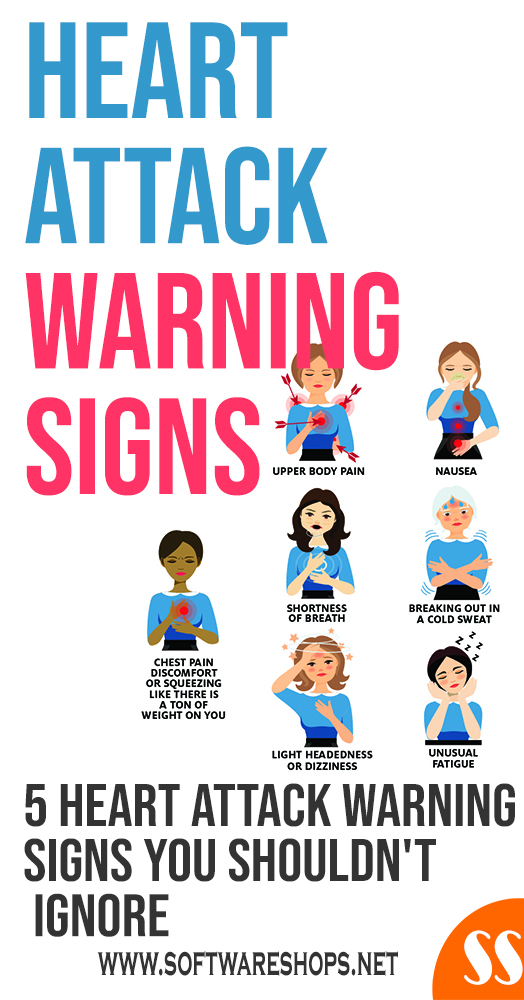Potential heart attack symptoms can be subtle, like extra fatigue, feeling out of breath or unexplained pains.
That unwell, breathless, overwhelmingly tired feeling you’re experiencing could be the first sign of a heart attack. Will you or your doctor dismiss it?
Heart disease is the No. 1 killer of men and women in the U.S., yet many people still think of it as a “man’s illness.”
Here are a few things men and women should know about heart disease and how to know if you’re experiencing a heart attack.
Symptoms not always obvious
“As a health care community, I think that we’ve done a really bad job of treating women,” Dr. Jennifer Haythe, co-director of the Women’s Center for Cardiovascular Health at Columbia University Medical Center, told TODAY. “We tend to write off women’s symptoms as they’re having a panic attack, they’re anxious.”
Still, predicting a heart attack before it happens can be difficult. Many men and women who die suddenly of coronary heart disease have no previous symptoms, according to the CDC.
“Some people will say it was out of the blue, and that’s probably most people,” said Dr. Sharonne Hayes, director of the Women’s Heart Clinic at the Mayo Clinic. “A substantial minority of patients will have some symptoms that, had they paid attention to them or sought an outpatient evaluation, they might have had a different outcome.”
Potential heart attack symptoms can be subtle. Here are five signs you should never ignore:
1. Chest pain
Even though women may experience some different heart attack symptoms than men, chest pain is still the number one warning sign for both sexes.
“It’s important to say that we’re way more alike than we are different,” Hayes said. “The main symptom for men and women is some type of chest discomfort, pain, pressure, burning. About 90% plus of men and women have that, if asked.”
The pain could be sharp, dull or the sensation that an elephant is sitting on your chest.
2. Lightheadedness, dizziness, and other pain
Where the differences between the sexes lie is that women have more shortness of breath, or nausea and vomiting than men, Hayes added. Women also more frequently have pain in the neck, jaw, throat, abdomen or back, the CDC notes.
Nerve fibers in the arm and jaw run together with the cardiac nerve fibers to the brain, so you may feel pain in those areas because your brain confuses the pain signal from the heart, Haythe noted.
Breaking out in a cold sweat, dizziness or lightheadedness can also be warning signs, the American Heart Association warns.
3. Changes in your ability to exercise
One big warning sign is lower exercise tolerance: You used to be able to walk up the stairs easily, but now you feel very breathless or even have to stop mid-way and take a break. That should be taken very seriously, Haythe warned.
“I find as a physician, one of the most helpful questions when somebody comes in and says they’re breathless, I say, think back: Could you do that earlier this summer or last summer, and now you can’t?” Hayes said.
If so, it may be time for a cardiac evaluation.
4. Heavy or labored breathing
Being short of breath or having labored breathing, especially while at rest, can be a sign of heart attack or heart failure — when the heart function is not normal. It can also be a sign of certain arrhythmias.
Get it checked out, Haythe said, especially if it’s a new phenomenon or others are making note of it.
5. An overall feeling of being uncharacteristically unwell or fatigued
Many people are familiar with the “Hollywood heart attack,” where a middle-aged man clutches his chest and falls over dead. In reality, symptoms can wax and wane, Hayes said.
Some people who simply report not feeling well or feeling fatigued go on to have a heart attack hours later. Sometimes, the chest pain is there, but the nausea is much more prominent so people may mistake the symptoms for the flu.
How can you tell what’s really going on?
The key is to know your risk factors. If you’re generally healthy and you wake up with what you think is the flu, you probably have the flu. But if you’re obese, sedentary, have high blood pressure and a family history of heart disease, you have to take your symptoms more seriously.
“I tell patients: If anything seems strange; if in your gut, you feel like something is not right,” Haythe said. “If you feel some sense of doom; if you feel like you’ve had a sense of indigestion or chest discomfort, trouble breathing or being lightheaded and it’s not normal for you, it’s persisting, it’s a little out of character … go see your doctor.”
Signs from your body about potential future risk
Some clues about your heart health and heart attack risk can show up years before in unexpected ways and places.
Women who have preeclampsia, or high blood pressure during pregnancy, are at increased risk for heart disease later in life, Haythe said.
Your body can also send some unusual signals, which are associated with increased risk of heart disease and heart attack, according to to a 2013 study published in the journal Circulation:
Having yellow fat deposits around the eyelids
Male pattern baldness
An earlobe crease — a diagonal fold or wrinkle in the skin of your earlobe
The risk was higher whether you had one, two or all three of those characteristics.
It’s not clear why, but Haythe said she does pay attention to patients’ ears and eyelids much more since the study came out.
